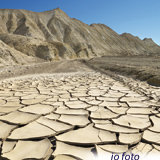|
Adaptation |
|
|||||||
|
The impact of global warming on the world’s climate to date is relatively small compared with what can be expected in the future, even if the increase in greenhouse gas emissions is stabilized. Furthermore, the results are likely to be highly uneven in their distribution, with low-lying coastal areas (such as small island developing States, the Bangladesh delta and the Netherlands) at risk because of rising sea levels; sub-Saharan Africa at risk due to desertification; a growing number of environmental refugees and increased pressure on sources of fresh water and on vulnerable ecosystems such as coral reefs, tundra and coastal wetlands. Adaptation to climate change is thus a key necessity for the global community. Changing global climatic conditions have an impact on ecosystems in general and on the human habitat in particular, for instance influencing access to natural resources such as drinking water and food, affecting health and migration processes, and causing severe atmospheric and oceanic disturbances. Citizens around the world are becoming more aware of the potential impact of climate change on their own lives. But the effects — and the ability to deal with these — vary from country to country. In particular, the most vulnerable countries in the developing world often do not have the technological, human, financial and governance resources needed to adapt to climate change. ICTs can play a role in environmental protection, waste management and in environmentally-friendly supply chain management. These applications fall under Programme 3 of the Doha Action Plan of ITU–D, adopted by the Word Telecommunication Development Conference in 2006. ICTs can more than compensate for their own effects and make a substantial net contribution to combating climate change and its consequences by supporting — and, in some cases, even making possible — concerted efforts to identify and measure the extent of the problem, develop effective response strategies, apply energy-saving and improved resource management technologies and processes across all sectors, and deal more effectively with disasters and other outcomes of climate change. ITU’s mission involves assisting Member States to develop the national strategies and capacities needed to promote sustainable development through the effective use of ICT networks, services and applications. By disseminating relevant information, tools and training materials, ITU supports raising awareness, improved policy-making and concrete actions to combat and adapt to the effects of climate change. Jointly with the United Nations Environment Programme (UNEP), ITU supports the Global e-Sustainability Initiative (GeSI) — a global partnership of major players in the ICT sector promoting technologies for sustainable development. Other multi-stakeholder partnerships deal with assistance to countries to foresee, prepare for and minimize the effects of environmental disasters, and to organize the provision of disaster relief through emergency telecommunications. Developing institutional partnerships with ITU for technical cooperation, that take into account the diversity of conditions in countries and regions around the globe, and contributing relevant specialist expertise in this area to the Union and its membership can make it possible to achieve the required success in this vital undertaking. At the ITU Plenipotentiary Conference, held in Antalya in 2006, Member States adopted Resolution 136 on the “Use of telecommunications/ICTs for monitoring and management in emergency and disaster situations for early warning, prevention, mitigation and relief”. This resolution calls upon the Directors of the Bureaux to continue their technical studies and to support the development of early-warning, mitigation and relief systems. ITU work in this field includes standardization of call priority in emergency situations (for example, Recommendation E.106 on the International Emergency Preference System for disaster relief). ITU–T has also assigned a special E.164 country code (888) to the United Nations Office for the Coordination of Humanitarian Affairs (OCHA) for the purpose of facilitating the provision of an international system of naming and addressing for terminals involved in disaster relief activities.
|
|


